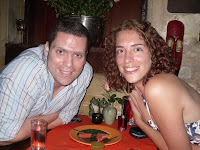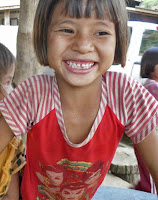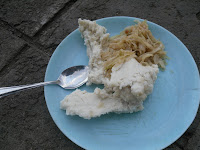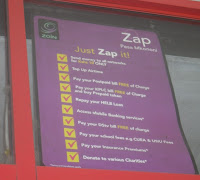 Moving on from our night of fun in Phuket Tom and I headed to Phi Phi island. Recommended by my colleague Gaurav - as well as the guidebooks - it promised to be the "real" Thailand - small coves and sandy beaches.
Moving on from our night of fun in Phuket Tom and I headed to Phi Phi island. Recommended by my colleague Gaurav - as well as the guidebooks - it promised to be the "real" Thailand - small coves and sandy beaches.We weren't disappointed. Phi Phi is a gorgeous little place as you can see from the photographs. It is, however, full of farang. It's all the island really exists for. It's a backpacker paradise - with the small town area simply full of guesthouses, tour shops, stalls and restaurants. If you accept that, then you can just enjoy Phi Phi for what it is - a place where all you can really do is swim, snorkel, sunbathe and eat seafood. Not a bad way of spending a few days - I could have happily spent a few months there to be honest.

We saw some fantastic fire-throwers, ate some great prawns and snapper and I even managed to trek up the hill to the view point over the isthmus to watch the sunset. Oh and of course quite a bit of swimming and sunbathing.
Aside from the idyll, for me, the most interesting part of visiting Phi Phi was the people I met there. Up at the viewpoint, I got chatting to an American guy who had spent a lot of time in China and was now travelling round Thailiand before returning to university in Texas. You think that someone who had obviously had to look at a map at some point might have a vague understanding of world geography. However, he thought that Kenya was in the Himalayas, and looked pretty oblivious about the mention of Africa as a continent on the whole. I returned from watching the sunset inspired by the beauty of the world but a tad depressed about the lack of curiousty and interest in life of some of its inhabitants.
However, the following day, when sitting on the ferry back to Phuket, I met Anu, an Indian girl from Delhi who was on her honeymoon. She met her fiance three months prior to the wedding through work. Her hands and feet were still covered in henna and her arms with the traditional wedding bangles traditional to her new husband's punjab tradition. She was a smart, gorgeous girl, with lots of ideas and a huge interest in the cross-fertilisation of cultures - and most importantly for her - the effect it was having on the rights of women in India. "Divorce is increasing - women don't have to stay in arranged marriages anymore in which their husbands don't respect them. Women can manage men in the workplace - we can get married later - have a career. It's all very new - we're on the threshold of change. It's exciting."
 She told me with some incredulity that she had heard there was still discrimination against women in western cultures. The way she talked about western culture actually made me feel ashamed. I so often feel embarrassed by and saddened by the export of the "western" way of life. I am constantly critical of it, constantly apologising for it. That's not to say that those criticisms aren't valid but looking at things through Anu's eyes gave me a very different perspective. As a women, she just saw the freedom and the opportunities it offered. She also saw it as something to be proud of. "Doesn't it make you happy," she said, "When you see everybody wearing your clothes?" I was so surprised I had to ask her to explain what she meant. "When I loan one of my non-Indian friends a Sari, I'm always so proud when they enjoy wearing it. For you - you see people of all different countries taking on your fashions all the time - so many different people and cultures like the way you dress and want to wear your clothes. Doesn't that make you proud?"
She told me with some incredulity that she had heard there was still discrimination against women in western cultures. The way she talked about western culture actually made me feel ashamed. I so often feel embarrassed by and saddened by the export of the "western" way of life. I am constantly critical of it, constantly apologising for it. That's not to say that those criticisms aren't valid but looking at things through Anu's eyes gave me a very different perspective. As a women, she just saw the freedom and the opportunities it offered. She also saw it as something to be proud of. "Doesn't it make you happy," she said, "When you see everybody wearing your clothes?" I was so surprised I had to ask her to explain what she meant. "When I loan one of my non-Indian friends a Sari, I'm always so proud when they enjoy wearing it. For you - you see people of all different countries taking on your fashions all the time - so many different people and cultures like the way you dress and want to wear your clothes. Doesn't that make you proud?"I was at a loss for an answer. All I could say was that I'd never thought about it like that - because that was the truth - I hadn't.































